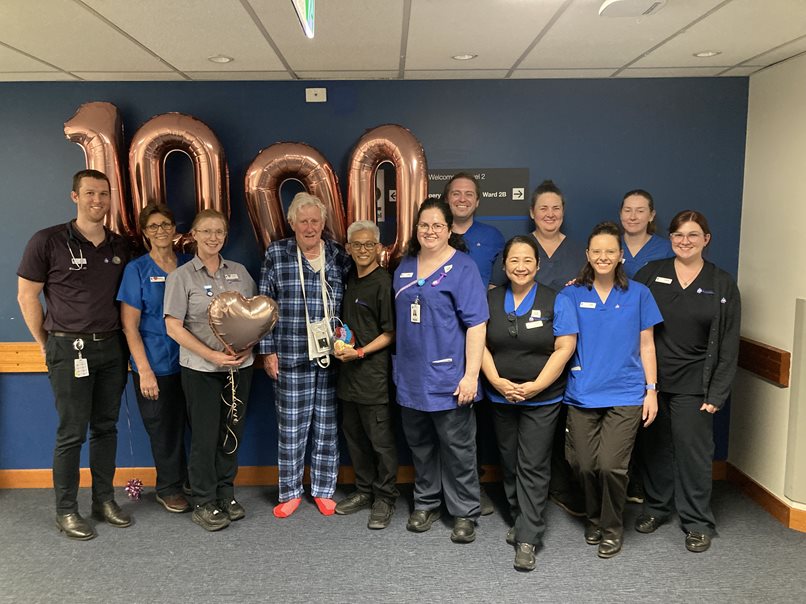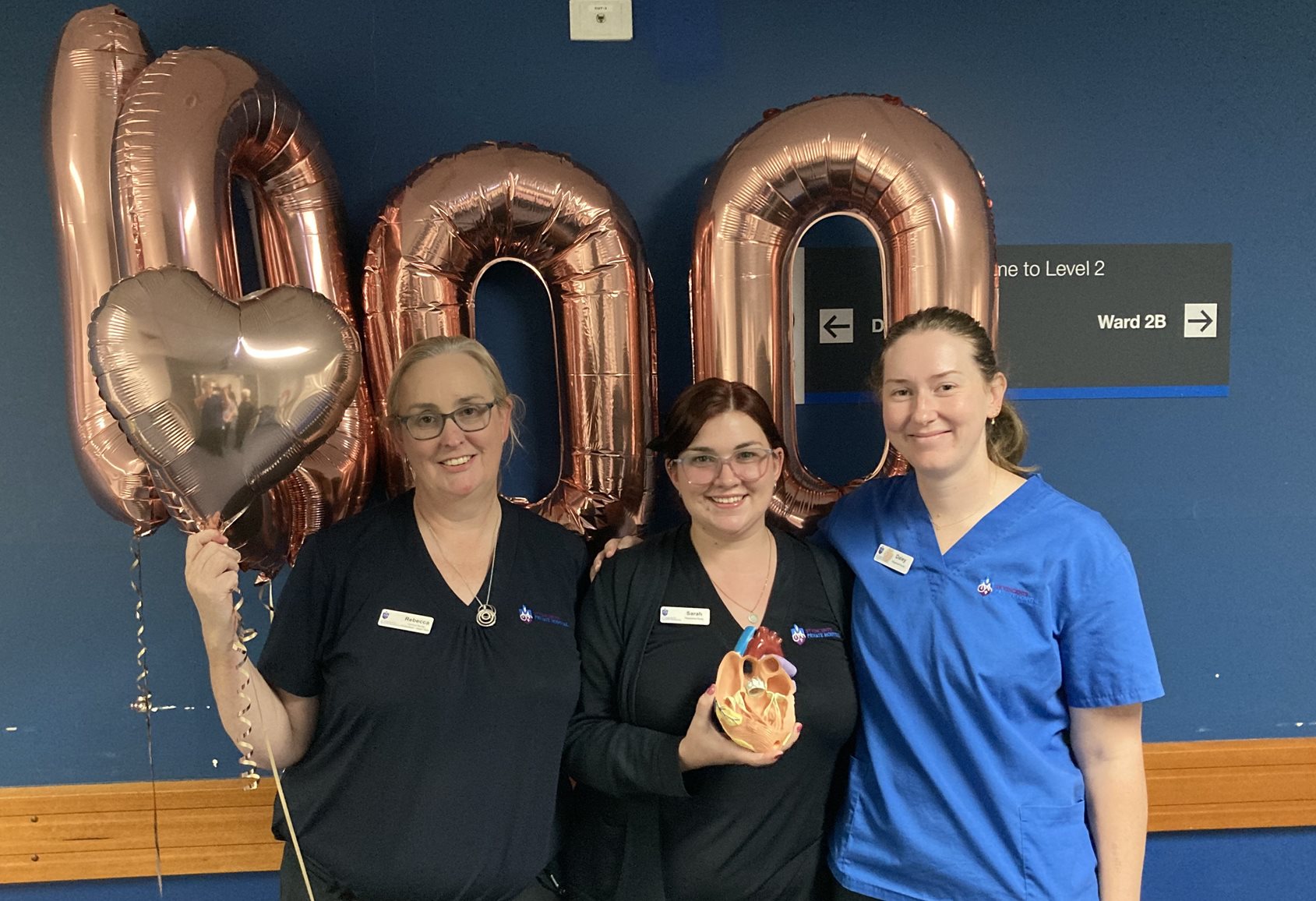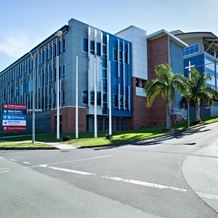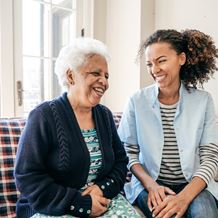Milestone cardiac procedure gives 90-year old Terry a new lease on life
St Vincent's Private Hospital Northside
St Vincent’s Private Hospital Northside is building on its reputation as a leading Australian cardiac hospital, with its team reaching an historic milestone last week, by performing its 1000th major lifesaving heart valve surgery, called a TAVI (Transcatheter Aortic Valve Implantation).
The procedure has major benefits for an ageing population with a massive increase projected in the next five years of a deadly heart condition called aortic stenosis.
Currently around 100,000 Australians have aortic stenosis, but the number of people with the heart condition is expected to double to 200,000 around 2030-31.
The 1000th TAVI comes almost 10 years to the month since St Vincent’s Northside performed its first TAVI procedure in October 2015. Retired Brisbane dentist, 90-year old Terry Brennan, was the beneficiary of the milestone procedure this week.
Click Here to view the 9 News story on Terry and the 1000th TAVI at Northside.

Terry had the procedure on Monday and was discharged home (where he lives independently) just two days later!
As people age, calcium can build up in the aortic valve, making it harder and thicker. As a result, the aortic valve is unable to open properly, forcing the heart to work harder to pump blood through the narrowed valve creating aortic stenosis.
It can lead to breathlessness, chest pain, fatigue and dizziness as well as general lethargy. Patients often experience the symptoms for a number of years, believing it’s ‘just part of getting old.’

Aortic stenosis can be easily diagnosed, starting with a visit to the GP who can pick up signs of a heart murmur and refer the patient for an echocardiogram (also known as an echo or cardiac ultrasound) and an appointment with a cardiologist.
The minimally-invasive TAVI procedure is a high-tech repair of the heart’s ‘exit door’ (or aortic valve) which allows blood to flow from the left ventricle to the rest of the body. It helps to repair the valve using an artificial valve made of natural animal heart tissue (usually from a cow or a pig) which is implanted into a patient’s aortic valve.
The TAVI can save the life – and restores the quality of life - of patients, especially older and more vulnerable patients who would otherwise face significant health challenges and months-long recovery from undergoing open heart surgery. If untreated, older people with severe aortic stenosis aren’t expected to live more than another two years.
The TAVI procedure, which usually takes around an hour, is designed to reduce the likelihood of serious complications and reduce the impact of the potentially fatal heart problem.
St Vincent’s Northside has a world class team of surgeons, cardiologists, nurses and support staff in its Structural Intervention Team with eight accredited specialists: Professor Darren Walters, Dr Roland Hilling-Smith, Dr Nicholas Aroney, Dr Akshay Mishra, Dr Dale Murdoch, Dr Andrew Clarke, Dr Karthik Gopal and Dr Lachlan Marshall as well as anaesthetists Dr Dan Dalllimore and Dr Swaroop Margale.
Professor Walters was part of the team that performed the 1000th TAVI procedure at St Vincent’s on Monday – and was also one of the surgeons who performed the first TAVI at St Vincent’s in 2015, along with Dr Clarke and Dr Con Aroney, father of Dr Nick Aroney who also performed the 1000th.

Channel 9 News reporter Lily Greer and cameraman John came to Northside to film a story on Terry and the 1000th TAVI
Professor Walters says: “The procedure has taken the world by storm because patients get a great result – it’s a safe procedure even for older patients in their 80s and 90s. They spend minimal time in hospital after the operation and then get to spend maximum time with their loved ones and they generally see an improvement in their mobility and quality of life.
“It’s a no-brainer that this therapy is a real winner for patients. This is definitely a lifesaving therapy. Patients have their life extended and have their quality of life improved.
“Personally and professionally it’s incredibly satisfying to think of all the people that we’ve been involved with after 1000 procedures. You remember every one of those people. It’s incredibly satisfying – it’s what keeps you going – seeing people come in – worried, concerned family members and then you can turn things around for them and they’re back on track.”
Dr Nick Aroney says: “The TAVI essentially means age is no longer an exclusion for people diagnosed with severe aortic stenosis even if they’re in their 90s. You go back a decade or so and this was often a death sentence for these patients whereas now it’s a quick procedure, a night or two in hospital with quite substantial improvement in their quality of life.

“It’s very satisfying being on the team that performed the 1000th TAVI with the connection back to my father (Dr Con Aroney) having performed St Vincent’s first TAVI operation.
“As a youngster growing up Dad would come home and tell me about the crazy ‘firsts’ for procedures that he did – and now to be here 20 years on and doing the surgeries with him some of the cases, it’s absolutely a great thing. I couldn’t be prouder for myself but also for him.”
Rebecca Elliott has been Clinical Nurse Consultant with the TAVI team since 2017, managing the flow of daily cases in the St Vincent’s Northsides theatres and has personally witnessed the life-changing and lifesaving effects of the procedure.
“We say to our patients that they will definitely feel better and have a better quality of life from the minimally invasive TAVI procedure,” says Rebecca.
“Most patients are back home within a few days of surgery and when we do follow up interviews a month after surgery, the vast majority report having more energy, less shortness of breath and can get back to doing the things that they value which could be playing golf, lawn bowls, walking, gardening or caring for grandchildren and loved ones.”
Rebecca says for some patients aged upwards of 70, it can be the difference between them living independently and having to move into an aged care facility.
“We had one patient last year aged in her 80s who just thought the fatigue she was experiencing was ‘because she was getting older’ and she was preparing to leave the family farm and move into an aged care. She had a TAVI and recovered really well and was home within two weeks and is still running the family farm which was the most important thing for her.”
 Heart Valve Nurse Team Rebecca Elliott, Sarah Williams and Daley Foxwell
Heart Valve Nurse Team Rebecca Elliott, Sarah Williams and Daley Foxwell
St Vincent’s Northside’s 1000th patient Terry Brennan spent his life working first as an electrician and then went back to study and qualified as a dentist, spending most of his life working in regional New South Wales.
He counts himself as one of the lucky ones with his health, not needing to attend a hospital anywhere for over 70 years from 1949 (when he had his appendix removed) until 2023 when he was diagnosed with bowel cancer.
“I live independently and I have been feeling recently as if I was slowing down a bit – feeling more tired when I walked up a hill and generally feeling a bit more tired. I just thought it was because I was getting older but two years ago I was diagnosed with severe aortic stenosis and we’re confident that having had the TAVI, it will extend and improve my quality of life,” says Terry.
“It’s unbelievable what they’ve done. The whole time I was dealing with St Vincent’s and in the hospital they made me feel as if I was in safe hands and very comfortable.
“And when I knew I was the 1000th it made me feel as if I was in very safe hands as I knew they had lots of experience at doing this.”
Terry was a mini celebrity for a day, agreeing to share his story with Channel 9 TV News which aired his story after his operation.
As he left hospital two days after his procedure, Terry said he was looking forward to getting back to his own home and “doing normal old age things … mow the lawn, go for a walk with the dog, enjoying time with family and catch up with friends while they’re still alive!”
- Home
- Patient News




